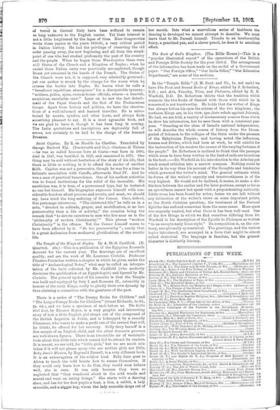In the "Temple Bible" (J. M. Dent and Co., is.
net each) we have The First and Second Books of Kings, edited by J. Robertson, D.D. ; and Acts, Timothy, Titus, and Philemon, edited by B. B. Warfield, D.D. Dr. Robertson thinks that the tradition which connects the two books of Samuel with those with which he is concerned is not trustworthy. He holds that the writer of Kings has always before his eyes the schism of the two kingdoms ; the northern Kings are, in his view, ipso facto rebels against Jehovah. He had, we are told, a variety of documentary sources from which he drew his information, but he uses them with a consistent pur. pose. "Standing at the close of Israel's national independence, he will describe the whole course of history from the bloom- period of Solomon to the collapse of the State under the pressure of the Babylonian Empire ; and having noted the influences, human and Divine, which had been at work, he will exhibit for the instruction of his readers the causes of the varying fortunes of the people." Dr. Robertson is inclined to think that the passages which seem to have been written in the land of exile are insertions in the text.—Dr. Warfield in his introduction to the Acts has put much sound criticism into a narrow compass. Nothing could be better in its way than his account of the thoughts and tendencies which governed the writer's mind. The general estimate which he forms of the writer's capacity and trustworthiness is of the very highest. He would not be inclined, it seems, to make a dis- tinction between the earlier and the later portions, except so far as an eye-witness cannot but speak with a preponderating authority. Little room has been found for notes; hence we are left without any intimation of the writer's views on some important points, as the North Galati= question ; the treatment of the Pastoral Epistles has suffered somewhat from the same cause. More space was urgently wanted, but what there is has been well used. One of the few things in which we find ourselves differing from Dr. Warfield is his description of the Epistle to Philemon as written " in an exceptionally loose style." Its composition is, on the con- trary, exceptionally symmetrical. The greetings, and the various topics introduced, are arranged in a form that might be almost called rhetorical. The language is familiar, but the general character is distinctly literary.






































 Previous page
Previous page